Newcomers in a strange land
Advertisement
Read this article for free:
or
Already have an account? Log in here »
To continue reading, please subscribe:
Monthly Digital Subscription
$1 per week for 24 weeks*
- Enjoy unlimited reading on winnipegfreepress.com
- Read the E-Edition, our digital replica newspaper
- Access News Break, our award-winning app
- Play interactive puzzles
*Billed as $4.00 plus GST every four weeks. After 24 weeks, price increases to the regular rate of $19.95 plus GST every four weeks. Offer available to new and qualified returning subscribers only. Cancel any time.
Monthly Digital Subscription
$4.99/week*
- Enjoy unlimited reading on winnipegfreepress.com
- Read the E-Edition, our digital replica newspaper
- Access News Break, our award-winning app
- Play interactive puzzles
*Billed as $19.95 plus GST every four weeks. Cancel any time.
To continue reading, please subscribe:
Add Free Press access to your Brandon Sun subscription for only an additional
$1 for the first 4 weeks*
*Your next subscription payment will increase by $1.00 and you will be charged $16.99 plus GST for four weeks. After four weeks, your payment will increase to $23.99 plus GST every four weeks.
Read unlimited articles for free today:
or
Already have an account? Log in here »
Hey there, time traveller!
This article was published 20/02/2015 (4013 days ago), so information in it may no longer be current.
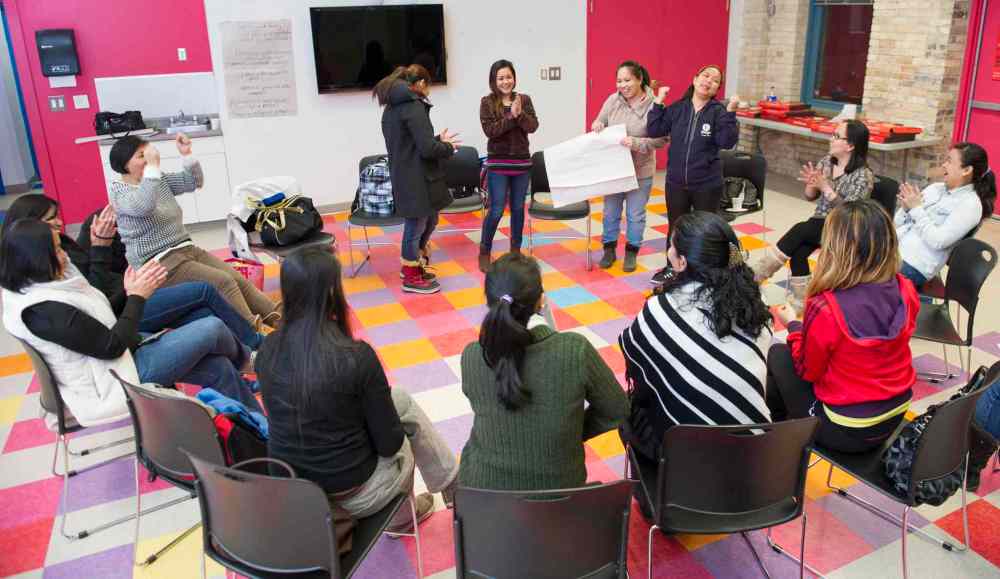
They come to Canada wanting to get settled and down to work right away. But for most newcomers, getting settled is far from easy. People struggle to find housing, jobs and acceptance.
The expectations they have when they arrive are more often than not dashed by disappointing reality.
Professionals discover their credentials are not recognized, then struggle to find menial survival jobs. Newcomers are often under pressure to send money to family members left behind who are depending on their success. Survivors who’ve witnessed genocide and unspeakable cruelty fled the horrors of war and now suffer in silence with post-traumatic stress disorder. Then there is the culture and climate shock, the language hurdles and discrimination.
Depression and isolation can set in, making matters worse.
In Manitoba, the number of immigrants and refugees arriving every year has more than quadrupled in the last decade, but there are still very few mental-health workers who specialize in helping them, said John Smyth, executive director of the Aurora Family Therapy Centre.
The counselling service run out of the University of Winnipeg has launched several pilot projects with federal funding to prevent newcomers from slipping into despair.
On Friday nights, women meet at the Manitoba Children’s Museum, where their kids and spouses can play while women offer support to each other and work through their challenges with a social worker who knows what they’re going through.
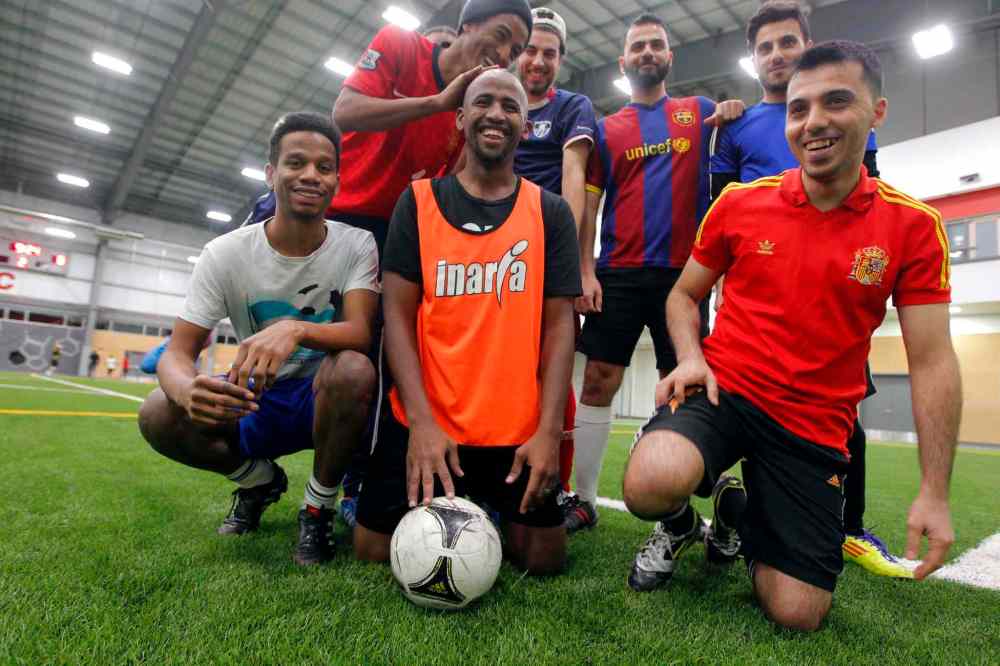
Men gather at the University of Winnipeg RecPlex for indoor soccer — a rare opportunity to socialize and run off some steam. And on Saturday mornings, they gather in a circle in the RecPlex multipurpose room for a group therapy-like discussion.
At three schools in the city, newcomer youth take part in leadership and employability skills training where they receive guidance and learn from each other about settling into a new culture.
Offering such “group work” is being proactive, said Winnipeg mental-health clinician Ala Albadri. Too often, attention isn’t paid to mental health until someone is having a crisis, he said.
“People are reactive — they wait until something happens,” the Iraqi-Winnipegger said.
That “something” could be a suicide attempt, substance abuse or a family dispute that results in child-welfare authorities or the police being called. Or worse.
Most people with mental-health problems are neither terrorists nor violent, but new research suggests solo terrorists are much more likely to have mental-health problems than members of either the general public or participants in group terrorism.
Mental illness can play a part “in shaping particular belief systems and in constructing the enemy, externalizing blame for one’s own failure or grievances onto this all-threatening enemy,” researchers at Indiana State University found.
More needs to be done to make sure newcomers are OK so they can be happy, productive and contributing members of society, said Albadri.
“Do something before things fall apart.”
The Aurora Family Therapy Centre might be on the right track, he said. Its pilot projects involving men’s, women’s and student groups are a way of helping people to help each other, said Albadri, who does not work there.
“It’s a way of healing, knowing ‘I’m not the only one going through this — I learn from you, you learn from me,’ ” he said. “Being together and sharing their problems, they’re disclosing what they’ve been through.
“Once you normalize it, it’s easier for them to handle and move on.”
The Aurora centre set up the pilot projects as another way to help newcomers when it learned Citizenship and Immigration Canada would no longer provide settlement-services funding for its therapy program for immigrant and refugee families.
It had spent eight years developing the specialized therapy program and building trust in the immigrant and refugee community. It connected with service providers and programs throughout the city. It had a network of interpreters and a small army of post-graduate students of all ages from around the world providing some of the 1,200 hours of therapy its clients received. Therapists went out into the community to meet the people where they felt safe.
“Specialized training for trauma became our specialty,” said Smyth. That program ended last year but will start again in April thanks to the United Way deciding to fund it. The pilot projects for men, women and youth received two years of federal funding and Smyth is hoping they can keep the groups going to keep newcomers feeling supported.
“When people are isolated they can really get into trouble.”
Building relationships, giving hope
On Friday nights, close to two dozen women meet at the Manitoba Children’s Museum to support and encourage each other. They can set aside the brave face they’ve been wearing all week and talk about finding their way in their new home while their spouses and kids play. Most have been in Canada for months — some for years. Some came because they have relatives here. Some are on their own, like Mila Dacwag, who arrived last summer as a federal skilled worker with her husband and two children.
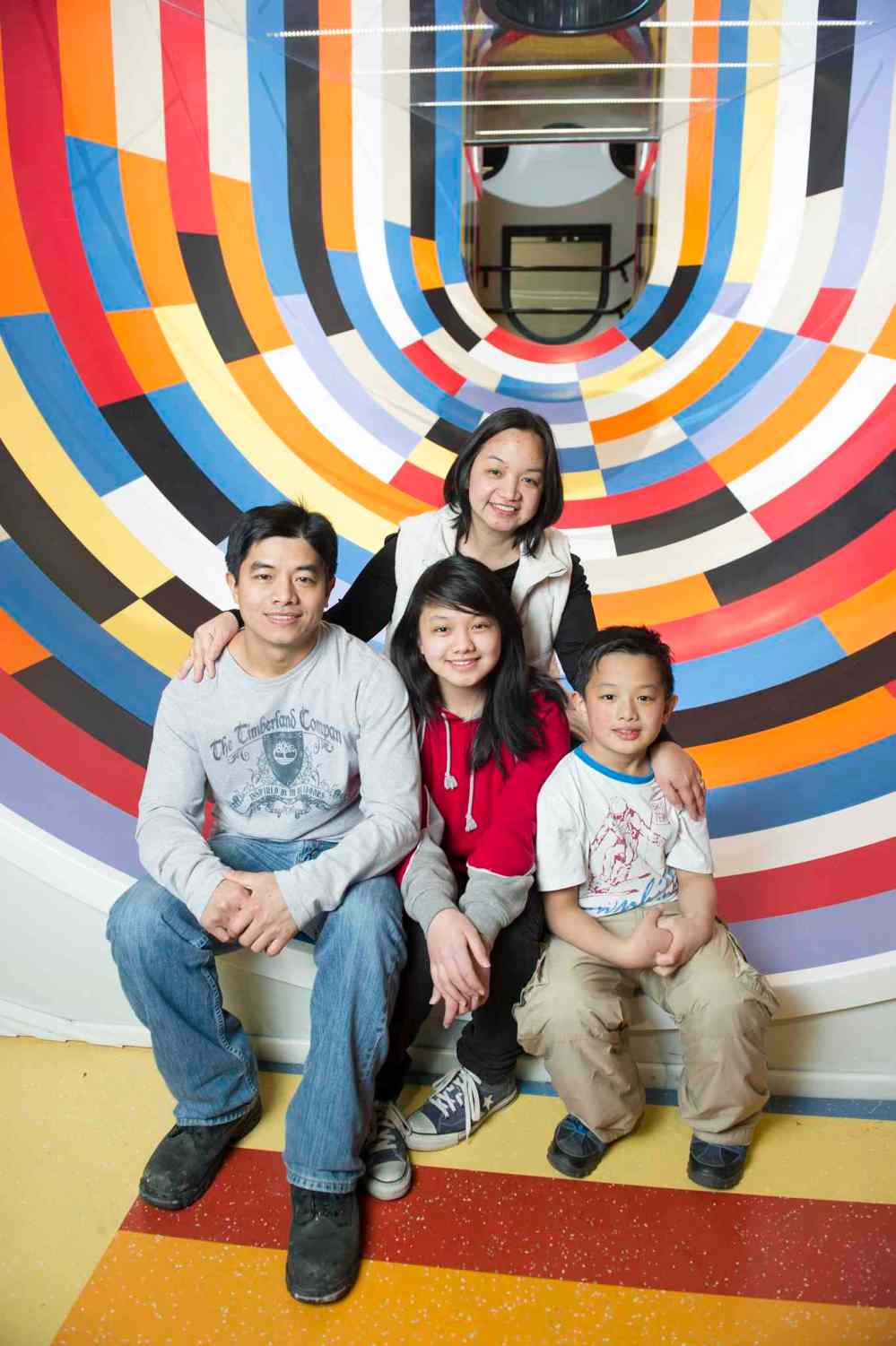
What’s surprising is they hail from the province’s largest source country for immigrants, and they are coming to a city where there is already a large network of community supports established by previous generations.
But not all Filipino newcomers to Winnipeg feel connected and at-home in Friendly Manitoba. Many, like Dacwag, who is a social worker, are still looking for jobs in their field.
“I’m a professional back home,” said a midwife. “Here, we start at zero. I’m sad I can’t practise here. That is my passion.”
When a teacher from the Philippines who’s not certified to teach in Manitoba joined the group in November, she cried at every session. One of her Grade 8 students from the Philippines, who came to Canada years ago, also attends the coffee club. “It’s awkward to see your student sitting in front of you,” she told the group. Now their roles are reversed. “She’s helping me.”
By February, the teacher was dry-eyed and able to talk about not being able to teach, the toll that has taken on her self-esteem and what she’s doing to set goals. “I’m here, and everyone is a blessing.”
They share common experiences — like being hassled over pronunciation and having an accent. A woman who works in a hospital said earlier in the week she was harassed and called a “racist” for mispronouncing an Anglo name. It was upsetting, she told the group whose members were nodding and could identify with the experience.
“Instead of going to the mall, I’m here and we’re bonding,” one of the participants said.
Others talked about struggling to improve their English while caring for their families and holding down a survival job. Some are learning to drive — a skill they say is not common for women in the Philippines.
The woman leading their group knows how they’re feeling. Roselyn Advincula was a social worker in the Philippines before she came to Canada six years ago.
When she arrived, she was told she’d end up working at McDonald’s and her husband in a “piggery.”
She started to believe it when she was turned away by a call centre and a factory that were both hiring. She didn’t give up — she got a job with the Society for Manitobans with Disabilities, helping with recreation programs. A social worker took her under her wing and encouraged her to do volunteer work and go back to school to get her social-work credentials recognized. Now she’s a certified social worker and a co-ordinator for the Aurora Family Therapy Centre. She set up the Women’s Coffee Club after reaching out to the newcomer community and settlement agencies to find out what was needed. It’s grown by word of mouth and now made up entirely of Filipinas.
“They meet new friends, share and learn from each other’s experiences,” Advincula said. One of the participants helped another find an apartment, for instance. “They’re building friendships, so they feel they belong.”
Before delving into the week’s discussion topic, the Friday night session begins with deep breathing exercises. Small children occasionally run in and out of the meeting room, whispering something in their mom’s ear.
The meetings are held in the Manitoba Children’s Museum to give families living on a tight budget a chance to experience a Winnipeg attraction for free.
“It’s part of the integration process,” Advincula said. “They’re getting to know a new place they haven’t had a chance to go to before.”
For Dacwag, the social worker who arrived last year as a federal skilled worker, Advincula is a role model.
Dacwag has had her social-work credentials recognized and is now learning to drive so she can get a job with a child-welfare agency. She credits Advincula with giving her hope and helping her reach her goals.
“She’s a mentor,” said Dacwag. Advincula credits the power of the group.
“This isn’t just about giving them information about settlement — it’s about building community and lasting relationships — something no one can buy.”
Feeling lost in transition
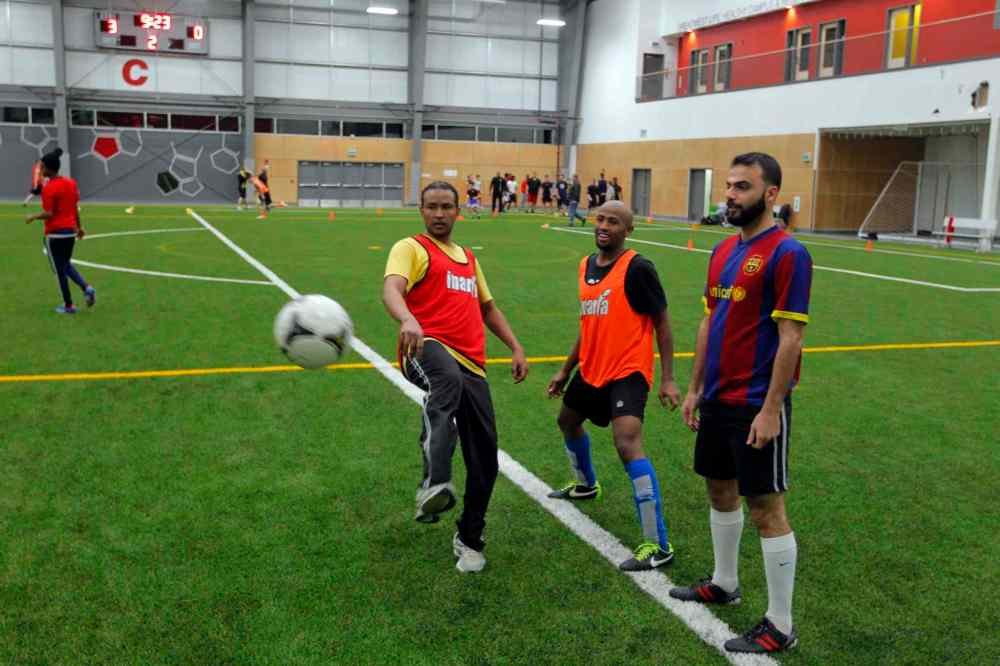
For a few hours a week, men from 10 countries across Africa and the Middle East are running around blowing off steam and sharing problems and solutions.
On Friday nights, the new arrivals take to the indoor soccer field at the University of Winnipeg RecPlex. It’s friendly but competitive. Some of the older men play; others stick to the sidelines providing colour commentary.
On Saturday mornings, they move upstairs to its multi-purpose room and sit in a circle for a two-hour session that’s part support group, classroom and snack fest, with coffee and doughnuts at the start and pizza at the end.
After struggling through his first winter in Canada — the worst on record in Winnipeg — Said Ali jumped at the chance to take part in Friday-night soccer and the Saturday-morning men’s group.
“Last year, there was no program — it was too freezing and too cold,” said the Somali-born electrician who arrived in Winnipeg alone in 2013. “There was nothing.”
This winter, he’s taking part in a federally funded pilot project organized by the Aurora Family Therapy Centre to help newcomer men find their way in their new home and connect with and support each other. Men are often the most isolated newcomers, having few chances to socialize or learn about their new culture and community.
“When people are new, they need systems and organizations to help them so they don’t feel isolated, victimized or hopeless,” Ali, 26, said through an interpreter. He juggles work and school to improve his English so he can take more training to be licensed as an electrician here. Doing that, and adapting to a new culture and climate, is a lot to deal with, but the weekly outings and connecting with others help him get through it, he said.
“When I came here, I was happy — there’s people worse off than me!” he joked.
Most of the men taking part in the pilot project have been in Canada less than a year. Some arrived with their spouses and children.
During a recent Saturday-morning discussion, the men talked about racism and a recent Maclean’s magazine article suggesting Winnipeg is Canada’s most racist city.
Ali said he experienced racism at airports on the way to Canada through Johannesburg and American cities. He was singled out by security time and again.
“You can feel really angry — you just experienced discrimination simply because of your face and your name.”
But he hasn’t felt that way since arriving in Winnipeg. He and others in the group wondered how anyone could prove the city is the most racist in Canada.
“I was shocked when I heard,” said Ali, another Somali who arrived last summer with his family. “My friends all told me in Winnipeg they don’t face gang stuff like other provinces do, and it’s good here for the family.”
Hassan, who’s been here since 2008, told the group he’d moved from Toronto to Winnipeg where he didn’t know anyone but found “the nicest people in Canada.” He recalled the time he was supposed to meet someone at a Tim Hortons, then discovered he was at the wrong Tim’s. A woman overheard his problem and offered to give him a ride. He was surprised by the stranger’s kindness and her trust in him.
“In the world, in any place, you can find good and bad people,” said one of the men.
While blatant racism hasn’t reared its ugly head since they arrived in Manitoba, almost everyone in the group said they’ve felt the sting of subtle discrimination.
“It’s difficult to find a job,” said Andre from Cameroon. “If you speak well, you can find a job.”
His friend from Chad said his kids are going to school, and now he’s going to school, too, so he can speak better English. He is volunteering to improve his job prospects.
One of the men said he had an unsettling experience when he left a recent Friday-night soccer game at the U of W. He put up his hoodie when he got outside and, within minutes, a police cruiser stopped him. “In winter, you’re supposed to be covering up,” he said. “If you’re black or aboriginal, you shouldn’t wear a hoodie?”
Others talked about the prejudice they’ve felt from having an accent and a non-Anglo name.
A man named Mohammad said he applied for a job at a factory in southern Manitoba with three friends from Sudan, Ethiopia and South Africa. They were all hired but he was not. He went back to the plant wondering if they’d lost his application. He was told they had no work for him.
He said he realized later he was the only one of his group with a Muslim name who applied to work there. He can’t prove it was discrimination and is in no position to complain to anyone in authority, he said. What he can do is tell the men’s group — they understand what he’s saying and feeling — and can give him some feedback.
“When we learn the rules, our rights and responsibilities, we can take a decision about what to do,” said Muuxi Adam. He organized and runs the group session and Friday-night soccer for the Aurora Family Therapy Centre and knows how the men are feeling. Since arriving nearly a decade ago, the Somali refugee has experienced the challenges of resettlement first-hand.
Adam has worked for newcomer agencies and seen people turned away by a landlord who said their cooking smells may be offensive. He’s seen newcomer youth randomly stopped by police saying they were looking “for someone who looked like you.”
Will to survive, thrive
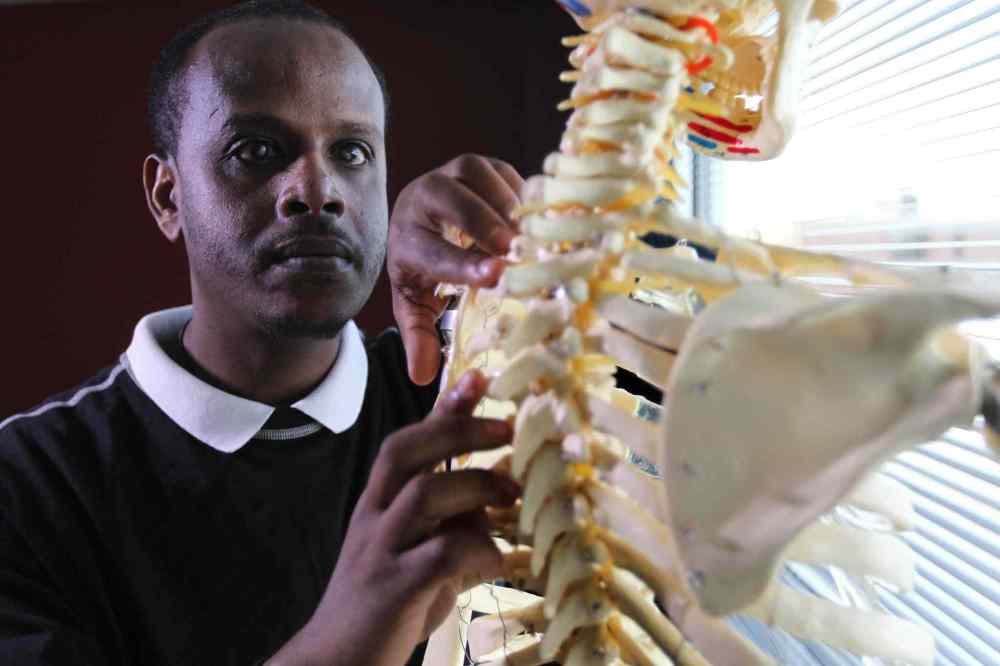
Gettachew Addgeh lost his sight to measles as a child. That hasn’t stopped him from finding his way around the world — from fleeing civil unrest in Ethiopia, to working in service jobs in Kenya and Uganda, to eventually arriving in Winnipeg in 2013.
Nor has it stopped him from learning to be a massage therapist. Rather than looking at photos and diagrams to learn anatomy, he relies on touch, much like reading braille, with instructors at Winnipeg’s Wellington College using body-part models to “show” him.
“Everyone is very co-operative,” said Addgeh, who looks forward to practising in four years.
He wasn’t always so optimistic.
When a friend sponsored him to come to Canada, Addgeh barely supported himself in Uganda working in a hotel. He spoke English and could read braille but, without any social safety net, he knew he could be jobless and homeless at any moment.
“If I don’t work, nobody cares for me.”
His first months in Canada weren’t easy. He lived in Winnipeg with his Ethiopian sponsor’s family, but was forced to leave because the landlord said the home was overcrowded.
Addgeh said most people were kind to him, but he didn’t know how to connect with support services, or how he would ever reach his goal of being a social worker.
“I was so disappointed and depressed,” said Addgeh, 33. “I thought things would be more easy for people with a disability. My expectations were very high.”

“He really struggled,” said Dr. Zephania Matanga, who took Addgeh under his wing. “He almost became homeless.”
Matanga runs the Canadian Multicultural Disability Centre. He founded the charitable organization 12 years ago with the hope of helping people participate more fully in Canadian life.
A Good Samaritan at Addgeh’s Ethiopian Orthodox Church helped him get a place to stay until he could access a Manitoba Housing unit, Matanga said. The young man was directed to the Canadian National Institute for the Blind, which provided him with a support worker and computer training to help him find his way around the city and the Internet. His online skills were put to work at the Canadian Multicultural Disability Centre, where he volunteered as a researcher and took inspiration from the man running it — who is also blind from measles-related complications and came to Canada from Zimbabwe.
“When I met Dr. Matanga, he himself is blind, he is from Africa and he has passed through this,” Addgeh said. “He tells me what the future could be.”
Matanga said the non-profit centre aims to be a “clearing house” that directs newcomers with disabilities to services and not trying to duplicate them. “We want to fill a gap or find an alternative,” he said. “There will always be challenges, but we want to minimize them as much as we can.”
It connected Addgeh with Reaching Equality — an organization that helps people get hands-on work experience and internships.
Addgeh learned that not being able to drive would be a disadvantage for him trying to get a job as a social worker, so he turned his mind to another kind of helping profession — massage therapy.
He’s now in school full-time and expects to be certified as a massage therapist in four years.
“The good thing is Gettachew is a very vibrant young man,” said Matanga.
His resilience in surviving so many challenges before getting to Canada is typical of many refugees Matanga encounters. Now Addgeh is passing along his determination and drive to succeed here to other new arrivals, he said.
“If he can do it, why can’t others? Work very hard and you can make it,” Matanga said.
That’s true for all privately sponsored refugees who must pass physical examinations to get into Canada, Matanga said.
“If two physicians can examine you and determine you’re going to be a burden, you will be barred.”
Disabled or not, the first year newcomers arrive is pivotal to their success, said Matanga. They come with such hope, but when they hit barriers and don’t see a way to overcome them, they can become isolated and depressed. Some don’t get help until there is a crisis, he said. Some don’t survive.
“It can be a life-and-death situation,” Matanga said. “It’s very important for support to be in place.”
Addgeh’s struggle during his first months in Winnipeg aren’t unusual. “He was stressed out,” said Matanga.
Other newcomers — who’ve been tortured, raped or witnessed the horrors of war — may arrive with invisible wounds that are the deepest and hardest to heal.
“They are struggling with one of the most challenging conditions,” he said. “It’s not easy to diagnose.”
Some religions see mental illness as demonic possession, and people will attend religious services hoping for healing. Mental illness is taboo in many cultures, and people suffer in silence rather than seek treatment, which doesn’t exist in many developing countries, he said.
Added to the mental and psychological injuries are the culture shock and isolation newcomers can experience. Mental health is the No. 1 issue that holds people back but doesn’t get addressed, he said.
“They don’t want to talk about it,” he said. “How can you overcome it if you were a child soldier or gang-raped in refugee camps?”
The memories and feelings from that time get bottled up and can fester — especially if they’re in a new country and not connected to school or work.
The centre piloted a group therapy program for young refugees with post-traumatic stress disorder that’s based on storytelling. Thirty people between the ages of 15 and 30 took part, and the program is starting it up again in July. Sharing stories about past trauma with those who can identify with them helps them to move forward with the clear message:
“There’s still goodness in you to overcome a tragedy” to feel joy and give back to society, Matanga said.
Whether they’re newcomers or not, giving people a hand when they need it not only makes them more productive — it prevents them from doing great harm to themselves and their communities, Matanga said.
“They’re not joining gangs or terrorist groups.”
carol.sanders@freepress.mb.ca

Carol Sanders
Legislature reporter
Carol Sanders is a reporter at the Free Press legislature bureau. The former general assignment reporter and copy editor joined the paper in 1997. Read more about Carol.
Every piece of reporting Carol produces is reviewed by an editing team before it is posted online or published in print — part of the Free Press‘s tradition, since 1872, of producing reliable independent journalism. Read more about Free Press’s history and mandate, and learn how our newsroom operates.
Our newsroom depends on a growing audience of readers to power our journalism. If you are not a paid reader, please consider becoming a subscriber.
Our newsroom depends on its audience of readers to power our journalism. Thank you for your support.

